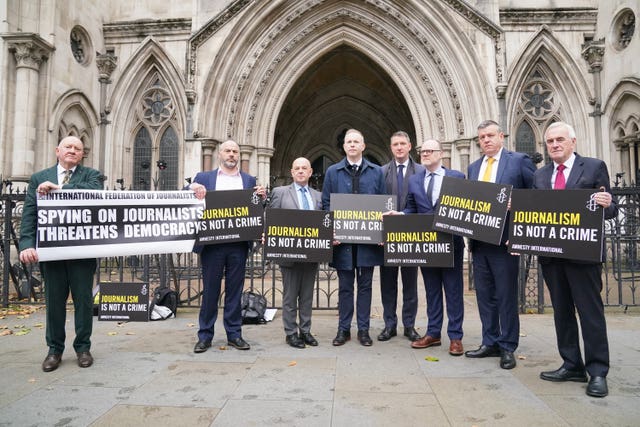A detective has told a tribunal that a senior police officer in Northern Ireland expressed concerns that the prevalence of Catholic judges in the region was leading to “perverse decisions”.
Former Durham detective Darren Ellis, who investigated a suspected leak in a documentary about a Troubles massacre, continued giving evidence to the Investigatory Powers Tribunal (IPT) hearing in London on Wednesday.
The tribunal is examining claims that investigative reporters in Northern Ireland were subject to unlawful covert intelligence by the police.
Under questioning, Mr Ellis told the hearing that he did not share the views about religious bias in the judiciary, adding that he “did not understand the Northern Ireland community”.

Journalists Barry McCaffrey and Trevor Birney were arrested in 2018 as part of an investigation into the alleged leaking of a confidential document that appeared in No Stone Unturned, about the 1994 UVF massacre in Loughinisland, Co Down.
The two men and the company behind the documentary were later awarded £875,000 in damages after the High Court in Belfast ruled that warrants secured by police to raid their homes and business offices in the city were wrongly obtained.
In 2019, Mr McCaffrey and Mr Birney lodged a complaint with the IPT asking it to establish whether there had been any unlawful surveillance of them.
Three police forces – the Police Service of Northern Ireland (PSNI), Durham Constabulary and the Metropolitan Police – are now part of a three-day IPT hearing about alleged unlawful covert surveillance.
Representing Mr McCaffrey and Mr Birney, Ben Jaffey KC raised an email sent by Mr Ellis to an officer in Durham this year which referred to an earlier exchange with an officer in Northern Ireland in 2020.
Reading from the email, Mr Jaffey said: “A senior officer informed me of the tensions within the legal system (in Northern Ireland) and advised me to exercise caution when dealing with solicitors, barristers and members of the judiciary, given the disproportionate representation of those from a Roman Catholic background.
“They explained to me that people from that community who chose to pursue a career in law were more often than not uncomfortable in joining the police as a chosen career and that was, with respect, despite the laudable aspirations of the Good Friday Agreement.”
Mr Jaffey added: “Part of the context that you are explaining is that there are lots of solicitors, barristers and members of the judiciary from a Roman Catholic background in Northern Ireland?”
Mr Ellis said: “Personally, I am not sure it is relevant to these proceedings. If others think it is, it is.”
The barrister continued: “The next paragraph. The officer informed me of what they considered to be perverse decision-making within the criminal justice process by those of a religious and political persuasion, given the prevalence of those from a Catholic background within the Northern Ireland courts system.”
Mr Jaffey added: “Do you share the concerns of that senior officer that you report in the email?”
Mr Ellis said: “I have sent that email. That is what I have said. I haven’t given my view.”
Mr Jaffey responded: “I am asking for your view.”
Mr Ellis said: “I don’t share that view. How could I share that view? One of the reasons I didn’t even want to take this investigation was that I didn’t understand the Northern Ireland community.”
Mr Jaffey said: “What you are really saying here is that the concern that you and the senior officer shared were that judges in Northern Ireland were making perverse decisions because they are from a Catholic background?”
Mr Ellis said: “I am passing on what that officer told me. I can remember that absolutely distinctly. I know where I was, I know what I had done and I know what I went on to do. That was a significant conversation I had, I know exactly what was said.”
Mr Jaffey said: “What I am suggesting to you is that was also a view which you shared?”
Mr Ellis responded: “I have said no to that question.”
The barrister continued: “Did you say to that officer that these types of sectarian allegations of judicial bias were unacceptable and you didn’t agree with them?”
Mr Ellis said: “An officer expressed that view to me in the context of the wider conversation. Whether I responded to that I can’t remember.
“Has it played a part in any of my decision-making? Absolutely not. Do I share that view? Absolutely not. I would love to be pointed to something else other than those words which suggests otherwise, because I don’t think there will be.”
The hearing before Lord Justice Singh, Lady Carmichael and senior barrister Stephen Shaw KC is due to conclude later this week with a judgment expected in writing at a later date.
The Police Service of Northern Ireland said in a statement that it is co-operating with the Investigatory Powers Tribunal and the Investigatory Powers Commissioner’s Office (IPCO).
“Separately, the Chief Constable has established the McCullough Review of the conduct of the Police Service of Northern Ireland arising from these and connected concerns,” it said.
“It would be inappropriate for us to comment while legal proceedings and the McCullough Review are ongoing.”




Comments: Our rules
We want our comments to be a lively and valuable part of our community - a place where readers can debate and engage with the most important local issues. The ability to comment on our stories is a privilege, not a right, however, and that privilege may be withdrawn if it is abused or misused.
Please report any comments that break our rules.
Read the rules here